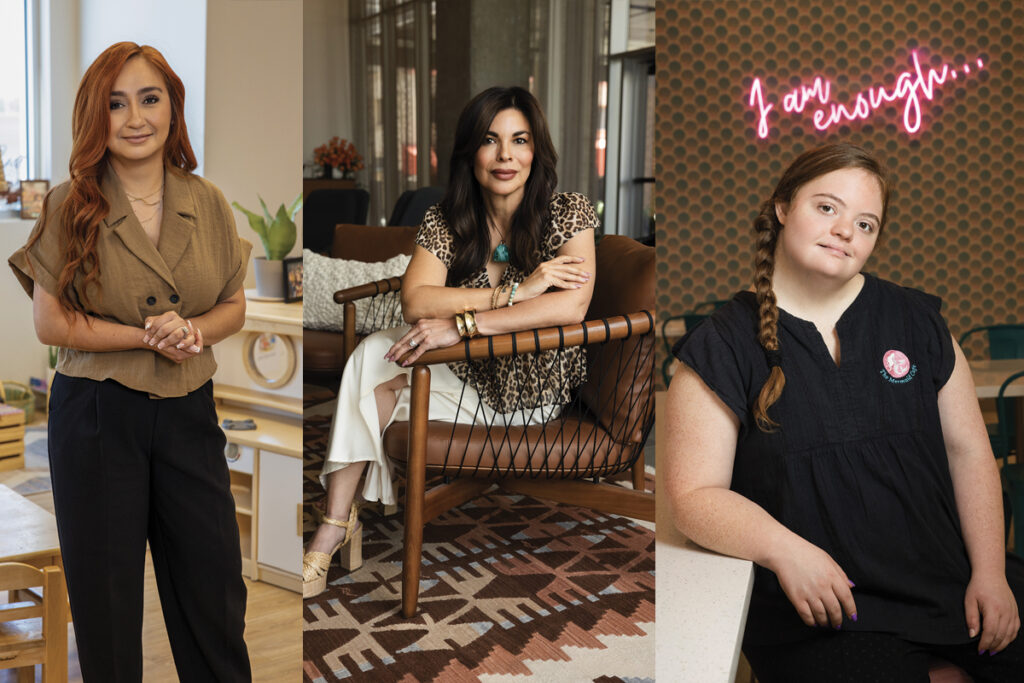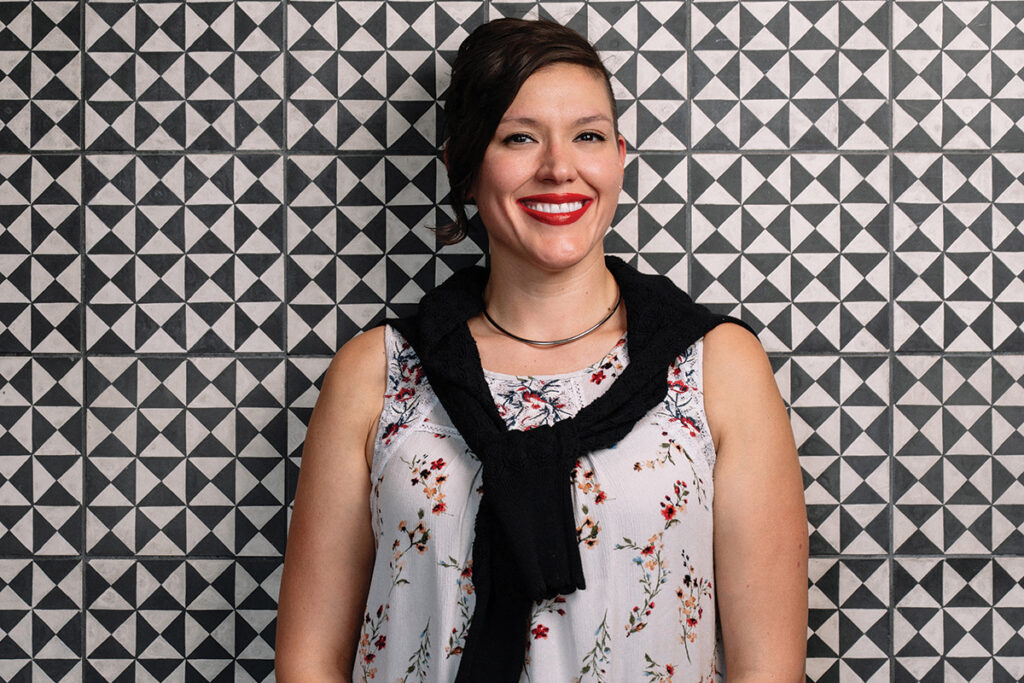
When Kimberly Finder, M.D., first decided to become a doctor, her present subspecialty didn’t even exist. While growing up in El Paso, she says, “My grandmother lived with us, and I used to tag along to her doctor visits with my mother or my aunt. I knew that becoming a doctor took a lot of education, but I wanted to help people.” Her mother would joke, “When you grow up, you can either marry a doctor or be one yourself.” Instead, says Finder, “I’m a double-dipper — I did both.”
From high school onward, she was determined to become a doctor, excelling in science courses, then earning a pharmacy degree from the University of Texas at Austin. She met her husband, Steven Finder, M.D., at a Halloween party during medical school at the University of Texas Health Science Center at Houston, where they spotted each other as kindred spirits, “since we were the only two people out of about 300 who weren’t in costume,” she says, smiling. Now the Finders co-own three businesses at two locations: the LipoSurgery Clinic, the Face Place and Smooth Solutions. Both she and her husband, a West Point graduate with an engineering background, had Army obligations after they graduated, which brought them to San Antonio to serve at Fort Sam Houston’s Brooke Army Medical Center. While he took an officer training course, she had the opportunity to take an elective course. “I asked for radiology, which was full, but dermatology was open, and I loved it,” she says.
Now a board-certified dermatologist, she started with general dermatology in a group practice. Aiming toward a solo practice of her own, Finder says, “I asked myself, ‘What do I want to focus on?’” At that time, the technique of doing tumescent liposuction (removal of excess fat from under the skin) under local anesthetic had just been developed. “It was so great to see how patients reacted afterward when they saw the change,” she says. When she talked about the procedure at home, her husband said, “If you love it so much, you should specialize in it.” In 1995, Finder wasn’t sure it would work. “I wondered, ‘Can I be in practice, just offering cosmetic services?’” she says. She took the plunge the following year, limiting her new practice to women. “That was for practical reasons,” she says. “First, it is technically harder, more strenuous to take fat out of a male, and I’m not a large person. Also, about 80 percent of the procedures I do are requested by women.” There was also an emotional side to her decision to treat women only: “Female patients feel more comfortable when they’re sitting in the waiting room if they know they won’t bump into a male co-worker. Women are very private about the things they have done.” Besides liposuction on various parts of the body, Finder also offers a range of facial services — minimally invasive procedures such as Botox, chemical peels and fillers such as Juvederm and Restylane. There weren’t many until the early 2000s, she says, but now “we have a lot of advances to offer in facial care.” She has carved out “a totally cosmetic practice,” she says, focusing on best practices and ongoing developments in this relatively new subspecialty.
 Her current patients range in age from early 20s into the 70s and 80s. “There is no age limit to what women seek nor what we can do,” says Finder. Most of her patients, however, are in their 40s or 50s, “in the prime of their working lives and competing with younger workers,” she says. “Their children may be out of the house, and this is a time they want to do something for themselves, to look better and to feel better.” As we age, says Finder, “bodies change, faces change.” Her patients “may not want to look 20, but they want to look the best 40- or 50-something they can be. They want their friends and family and co-workers to say, ‘You look great today; did you get a new haircut?’ and not ‘What happened to your face?’” At 54, the doctor herself uses Botox and “a small amount of filler”; she looks much younger than her years but the changes are subtle — no frozen forehead or random puffiness. “I wouldn’t use anything on my patients that I don’t believe in,” she says. “Either I do it personally, or I would if I were a candidate for that procedure. There are some cosmetic procedures I don’t offer, because they haven’t been shown to be safe or effective.” That’s another principle of Finder’s practice: Not everyone who wants a particular procedure should get it. Though she’ll speak to prospective patients on the phone, she says, “You can’t tell what you can do for a patient until she comes in.” During that first consultation, says Finder, “I ask each patient, ‘What are your goals?’ A goal she likes might not be realistic.” For instance, liposuction might not work for a patient in her 40s or 50s, a time when women tend to shift the storage of fat from under the skin to around the internal organs. “Lipo is not going to help those patients,” says Finder, “so I recommend a weight-loss program.”
Her current patients range in age from early 20s into the 70s and 80s. “There is no age limit to what women seek nor what we can do,” says Finder. Most of her patients, however, are in their 40s or 50s, “in the prime of their working lives and competing with younger workers,” she says. “Their children may be out of the house, and this is a time they want to do something for themselves, to look better and to feel better.” As we age, says Finder, “bodies change, faces change.” Her patients “may not want to look 20, but they want to look the best 40- or 50-something they can be. They want their friends and family and co-workers to say, ‘You look great today; did you get a new haircut?’ and not ‘What happened to your face?’” At 54, the doctor herself uses Botox and “a small amount of filler”; she looks much younger than her years but the changes are subtle — no frozen forehead or random puffiness. “I wouldn’t use anything on my patients that I don’t believe in,” she says. “Either I do it personally, or I would if I were a candidate for that procedure. There are some cosmetic procedures I don’t offer, because they haven’t been shown to be safe or effective.” That’s another principle of Finder’s practice: Not everyone who wants a particular procedure should get it. Though she’ll speak to prospective patients on the phone, she says, “You can’t tell what you can do for a patient until she comes in.” During that first consultation, says Finder, “I ask each patient, ‘What are your goals?’ A goal she likes might not be realistic.” For instance, liposuction might not work for a patient in her 40s or 50s, a time when women tend to shift the storage of fat from under the skin to around the internal organs. “Lipo is not going to help those patients,” says Finder, “so I recommend a weight-loss program.”
Once she knows a patient’s goals, she says, “We match them up with what’s available.” If the goals are numerous, she’ll start a patient with one procedure and schedule the rest over time. “And if we can’t provide what they need,” she says, “I’ll refer them to someone who can,” such as a plastic surgeon for a tummy tuck. Occasionally, she’ll pick up a medical problem during an examination, such as possible skin cancer. “I don’t do skin-cancer surgery anymore, but I can send them to a colleague who does,” says Finder. A patient who had been treated for breast cancer more than five years earlier in another country and had not had a checkup since came in for a consultation about liposuction for the underarm area. “I told her that it might be breast tissue and recommended mammography, since it had been so long since she had been seen by an oncologist,” says Finder.
She asks her patients who come in for regular maintenance of procedures such as Botox and fillers to come in for follow-up visits, something that surprises previous spa patrons. “I like to see what I’ve done,” she says. “If the results are good, then I know we’re on the right track. If the patient isn’t happy, I don’t know how to make it better the next time if I haven’t seen what’s wrong.” One of the advantages of receiving facial services from a physician, she says, “is that I have a lot of experience, since this is what I do. I know why and how these procedures work, and I can answer (patients’) questions about them.”
While Finder believes that “everyone has the right to age,” she thinks women have an equal right to enhance their appearance. “We color our hair, we wear makeup, we like to look pretty in clothes,” she says. “Why should (cosmetic dermatology) be any different?” In her consultations, she says, “I don’t judge. The procedures I offer aren’t right for everyone, but for some people, the results will enhance their appearance and change their lives.”

Occasionally, she’ll meet a patient whose problems seem to be bigger than dissatisfaction with her appearance. “If I’m talking to someone who is very unhappy about something in her life besides what these services can help with — like a bad divorce — I will tell her, ‘Maybe this procedure isn’t what’s going to make you happy,’ then refer her to a good psychologist,” she says. As a solo practitioner, Finder has to play two roles — as a physician and as a business owner. She spends about 40 hours a week as a doctor, seeing patients, and another 10 taking care of business, usually outside of business hours. It helps that her husband of 26 years is her “best friend and business partner,” she says, since they can work on that aspect together. Appointments slow down somewhat after Christmas, and the Finders often take getaway vacations in January and February. “Most of the time, we’re focused on work here,” she says, “but we’ve developed a passion for skiing, so we go on vacations with a ski club.” The couple also enjoy scuba diving and hiking on mountain trails — and, yes, the Finders pack sunscreen, hats and gloves to protect their skin from the sun. “After some whopping sunburns, I learned early to stay out of the sun,” she says. “Tan skin is the enemy — stick to spray tans and self-tanning lotions!”
For those considering cosmetic procedures, she has further advice: Ask for a meeting with the doctor — not a salesperson — before you make any decisions, and ask the doctor how long he or she has been doing the procedure and what kind of medical training they have. “I’ve had patients who have had a bad result from doctors who don’t know how to undo the procedure if they don’t get the desired results,” she explains.
Though her life as a physician hasn’t been exactly the one she imagined as a child, she says, “I have a fabulous career. When I get the chance to talk to medical students, I tell them that taking a chance on cosmetic dermatology was the best decision I ever made.”




